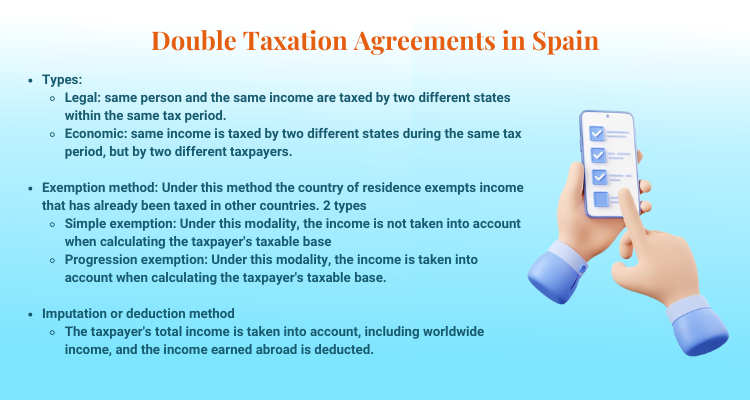Navigating the labyrinthine world of international taxation can be daunting for individuals and businesses alike. One of the critical tools designed to ease this burden is the Double Taxation Agreement (DTA). These agreements play a crucial role in preventing the same income from being taxed in two different jurisdictions. This article delves into the intricacies of DTAs and their impact on tax refunds in three major European economies: Spain, France, and Italy.
Decoding Double Taxation Agreements in Europe
Double Taxation Agreements are treaties between two or more countries that aim to prevent individuals and businesses from being taxed twice on the same income. These agreements are particularly vital in a globalized world where cross–border economic activities are the norm. DTAs typically cover various types of income, including salaries, pensions, dividends, and royalties, ensuring that taxpayers are not unfairly burdened. For instance, a French company operating in Spain would rely on the DTA between France and Spain to determine its tax obligations and avoid double taxation.
The primary mechanism employed by DTAs to prevent double taxation is the allocation of taxing rights. This involves deciding which country has the right to tax specific types of income. For example, under many DTAs, the country where the income is generated (source country) may have the primary right to tax the income, while the taxpayer‘s country of residence may provide a tax credit or exemption to mitigate double taxation. This allocation is crucial for maintaining fairness and encouraging cross-border economic activities.
Another essential feature of DTAs is the mutual agreement procedure (MAP). This mechanism allows tax authorities from the countries involved to resolve disputes and ensure that the DTA is applied correctly. The MAP can be particularly useful when there are ambiguities or conflicts in interpreting the treaty provisions. For example, if a Spanish resident believes they are being unfairly taxed on income earned in Italy, they can invoke the MAP to seek resolution between the Spanish and Italian tax authorities.
Impacts on Tax Refunds in Spain, France, and Italy
In Spain, DTAs significantly impact the process of claiming tax refunds for foreign income. Spanish residents earning income abroad can avoid double taxation by applying for a tax credit for the taxes paid in the source country. For example, a Spanish resident who pays taxes on rental income in France can claim a tax credit in Spain, reducing their overall tax liability. This process is streamlined by the DTA between Spain and France, ensuring that taxpayers are not penalized for their cross-border activities.
France also benefits from DTAs in terms of tax refunds. French residents who earn income in countries with which France has a DTA can often apply for a tax exemption or credit. For instance, a French freelancer working for an Italian company can avoid double taxation by leveraging the DTA between France and Italy. The freelancer would declare the income in France and apply for a tax credit for the taxes paid in Italy, thus preventing double taxation and potentially leading to a tax refund.
Italy’s approach to DTAs and tax refunds is similarly structured. Italian residents earning income abroad can utilize DTAs to claim tax credits for foreign taxes paid. For example, an Italian investor receiving dividends from a Spanish company would first be taxed in Spain. The investor could then apply for a tax credit in Italy, reducing their Italian tax liability on the same income. This system not only prevents double taxation but also simplifies the process of claiming tax refunds, making international investments more attractive.
Understanding Double Taxation Agreements and their implications is essential for anyone engaged in cross-border economic activities. These treaties play a pivotal role in ensuring that income is not unfairly taxed twice, thereby promoting international trade and investment. By examining the impacts of DTAs on tax refunds in Spain, France, and Italy, it becomes clear that these agreements are indispensable tools in the global economy. Whether you are an individual or a business, leveraging DTAs can lead to significant financial benefits and a smoother tax experience.
